WEO has already successfully launched training centers across Sub-Saharan Africa, primarily in English-speaking countries. A 2023 visit to Senegal led to our first francophone center and underscored the need for training in that region. Regional endoscopy training has been provided by teams from Egypt and South Africa and offered a socially and environmentally sustainable model. To assess training needs and capacity in North Africa, we visited centers in two countries.
Casablanca, Morocco
Morocco, a Mediterranean kingdom in northwest Africa, gained independence from France in 1956. While Rabat is the political capital and hosts a World Gastroenterology Organisation (WGO) training center, Casablanca, Morocco’s economic hub, is its largest city, with 3.2 million residents. The culture is modern yet conservative, with lively street life. Although less touristy than Marrakesh, the city offers excellent amenities.
Morocco has basic universal health insurance, but public hospitals are under-resourced and overstretched. The country has several hundred endoscopists providing standard diagnostic and therapeutic services. ERCP is widely available in public hospitals, and endoscopic ultrasound (EUS) in some. To address the shortage of doctors, the government has supported the Cheikh Khalifa ibn Zaid Foundation and the semi-public Mohammed VI International University Hospital, both backed by King Mohammed VI.
Mohammed VI International University Hospital
Mohammed VI Foundation for Sciences and Health (FM6SS): Created by King Mohammed IV to expand health and science education, FM6SS is a nonprofit organization managing three universities in Casablanca, Rabat, and Dakhla, along with several healthcare facilities. These include two university hospitals in Casablanca, and upcoming institutions in Rabat and Dakhla, along with smaller regional hospitals. The Foundation is strongly focused on collaboration with African countries as a member of the African Academy of Health Sciences.
I met Professor Wafaa Khannoussi, Head of Endoscopy, who is leading the modernization of the Foundation's two GI units. An interventional endoscopist with previous roles in the European Society for Gastrointestinal Endoscopy (ESGE) and United European Gastroenterology (UEG), including Chair of the UEG Quality of Care Task Force, Prof. Khannoussi first introduced me to the Mohammed VI Hospital. Originally built in 2020 for COVID-19 treatment, it was repurposed in 2022 as a general hospital. This modern 400-bed facility includes surgery, interventional radiology, and intensive care unit (ICU) services. Despite its advanced infrastructure, activity was modest – probably because co-payment and insurance barriers limited patient access.
The endoscopy unit includes three procedure rooms – one equipped with a C-arm for ERCP and another for proctologic surgery and endourology, largely performed by gastroenterologists. While the equipment initially lacked narrow-band imaging (NBI) capability, this has since been updated.
Procedures are done under patient sedation with anesthetist and nurse support. Endoscopy training is part of the final year of a four-year GI residency, with advanced procedures taught via proctoring and performed independently when deemed appropriate. Nurse training is also provided on site.
The unit has six endoscopists, two performing ERCP and one EUS independently, with others in training. There are 13 residents, three interns, and several students. The gastroenterology unit covers all general GI and hepatology services.
We also visited the Cheikh Khalifa Foundation Hospital, home to a busier but older endoscopy unit equipped with the latest Fuji 700 series systems and four procedure rooms. Both centers require prefiltration systems for scope autowashing due to water quality issues – these are integrated into the equipment.
The University features an advanced simulation center, with an entire floor devoted to GI training. Simulation is a core part of medical education nationally, supported by significant investment in models, computer-based systems, and animal labs.
Prof. Khannoussi conducts several annual EUS training courses for Moroccan doctors and is developing a structured curriculum for a year-long EUS school. It will consist of multiple short hands-on courses, progressing trainees from novice to expert, with the goal of teaching all participants to identify stones and perform fine-needle aspiration (FNA) on pancreatic masses. These courses will be open to international students.
I also met Professor Ahmed Bennana, the hospital director, who expressed strong interest in expanding endoscopy training and offering hands-on courses for Sub-Saharan African colleagues. A memorandum of understanding (MOU) is being prepared to welcome Mohammed VI International University Hospital into the WEO training center network.
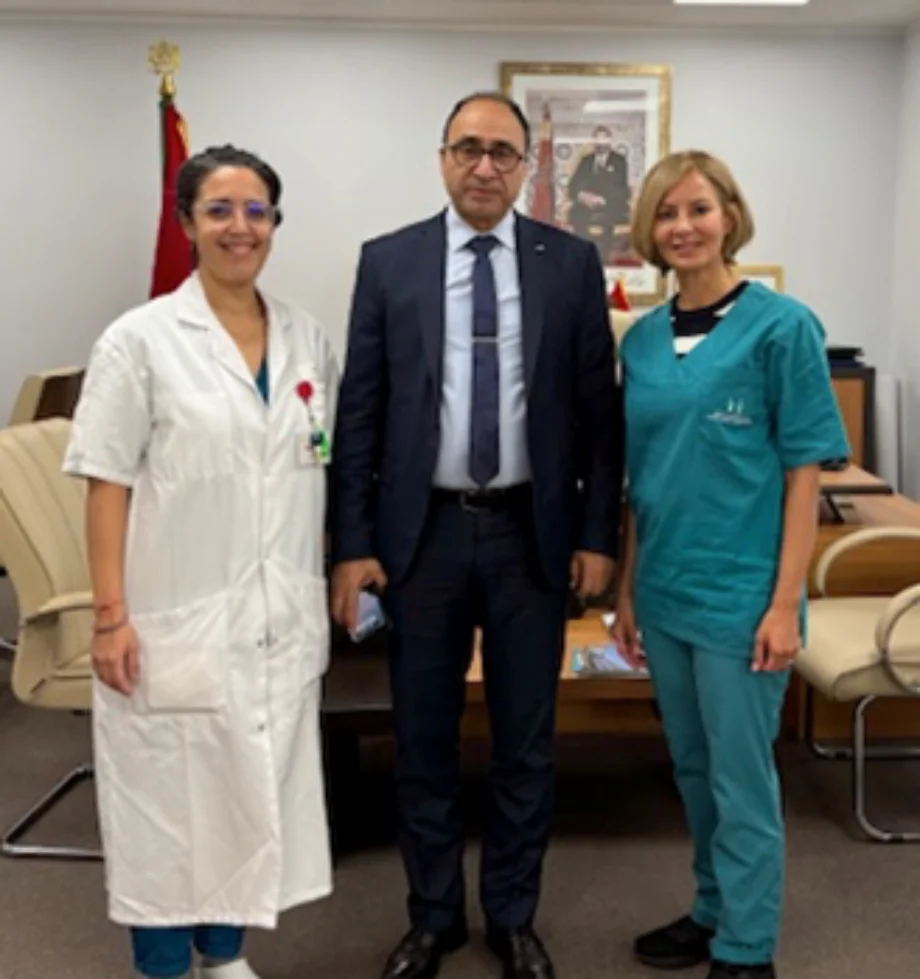
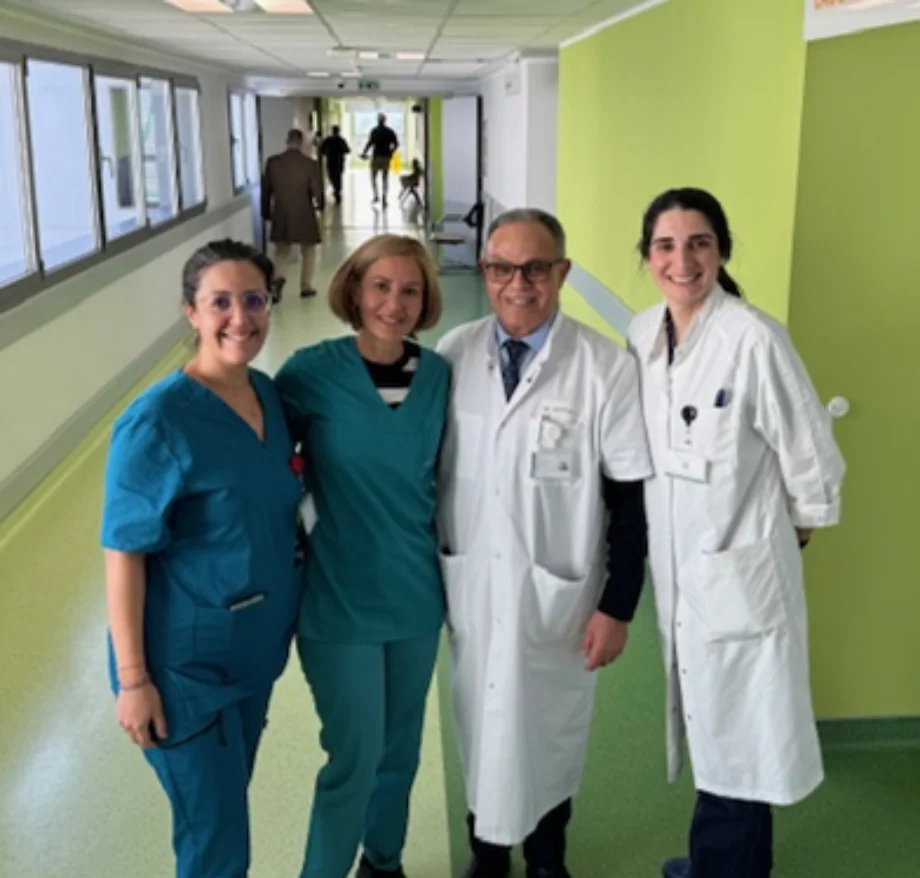
Hôpital Ibn Rochd
Several Casablanca's public hospitals follow a decentralized model. I met Prof. Mohamed Tahiri, Head of Gastroenterology at Hôpital Ibn Rochd and President of SMMAD (Société Marocaine des Maladies de l’Appareil Digestif). A WGO member, Prof. Tahiri co-hosted their 2024 conference in Marrakesh and provided valuable insights into the Casablanca medical system.
Basic health insurance offers free care at public hospitals and clinics, but endoscopy services are basic, and training is minimal, leading to poor practices and frequent equipment damage. Facilities are overwhelmed, with long waiting lists and high patient volumes – Prof. Tahiri has over 100 patients waiting for ERCP on his own list.
I visited the public hospital, which resembled other African hospitals: overcrowded and rundown but clean and well-staffed. The endoscopy unit has two procedure rooms and a rectal-surgical room. They perform standard upper and lower endoscopies and EUS, with ERCP done in the emergency department for better access to the operating room in emergencies.
There are six endoscopists at Hôpital Ibn Rochd, supported by over 40 trainees, including both African and Moroccan doctors. Training is mostly basic, with limited opportunities for advanced procedures despite strong demand. Advanced training is available in France, Canada, or at the public hospitals in Casablanca and Rabat. The public university also has a large simulator unit with animal models for specific endoscopy procedures.
Research is limited, likely due to complex ethics requirements. It seems that expectations for WEO involvement were low, possibly because of previous experiences with other organizations. Establishment of a WEO training center at Hôpital Ibn Rochd is a future possibility. Offering training in better-equipped centers while including trainees from all over Casablanca could help build trust and establish our presence.

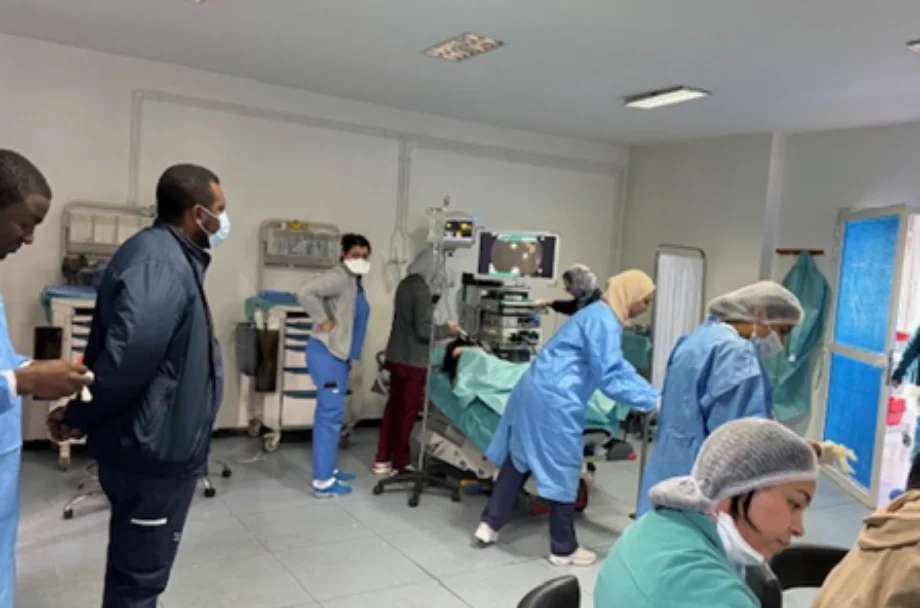
ALGERIA
Bordering Morocco to the east, Algeria is a modern, European-style country with growing peaceful development and an increasingly relaxed border policy. After gaining independence from France in 1962 and enduring a civil war until 2002, Algeria has seen significant social progress in recent years, including universal healthcare, education, and a growing middle class. I mainly visited the capital, Algiers, but also stopped in Constantine and Setif. My connection to the country came through Mohammed Omar, Chair of the WEO Middle East Committee, who knew endoscopist Imad Bougedouma. Over coffee, I learned that Imad had trained with Prof. Aabakken in Oslo, who keeps an Algerian sand painting as a memento.
GI training in Algeria takes place exclusively in the public hospital system, starting immediately after internship and continuing for four years, with the final year focused on endoscopy. There are three training hospitals in Algiers and a few others across the country. Algeria’s vast landmass and distance between hospitals contribute to a significant shortage of proceduralists and trainers. The medical system is divided into private and public sectors, with doctors unable to work in both systems simultaneously. This, along with the lack of part-time options, has contributed to a lower number of female gastroenterologists, even though 55%–80% of trainees are women, as childcare responsibilities often prevent full-time practice.
Constantine
Constantine, a historic city in northeastern Algeria, was once the region's capital and has been continuously inhabited since prehistoric times. It is known for its bridges, underground caves, and Roman architecture, and the city is also home to a prominent endoscopy facility. After touring the city with gastroenterologist Nour Chahad, we visited the private facility, which includes two recovery beds, one dedicated endoscopy room, and two operating suites. EUS and ERCP are available. Nour regularly hosts 2–3-day training courses on EUS and endoscopic submucosal dissection (ESD) with Egyptian colleagues and is eager to have WEO endorsement. Most training is done on actual patients who are not charged. A new hospital, planned to open later this year, will feature a multi-room gastroenterology suite.
Setif
On my way back to Algiers, I stopped in Setif, a modern city with affluent residents and rich Byzantine history. Imad Bougedouma works in a well-equipped practice with other endoscopists, though logistical challenges limit some aspects of service. He regularly runs training courses, often with Egyptian collaborators, and is planning an EUS course in May for which he seeks WEO endorsement. Imad trained at Mustafa Bacha University Hospital in Algiers, where he still has strong ties, and it was our next stop.
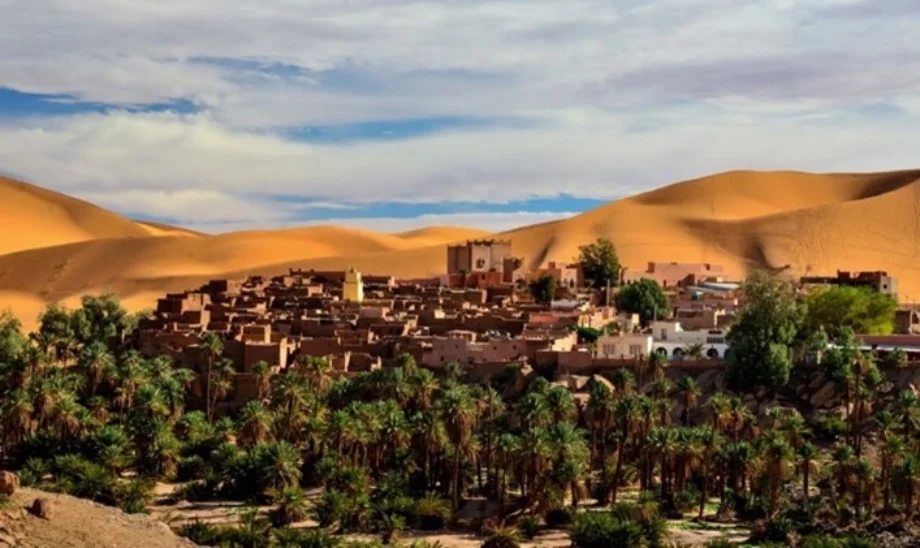
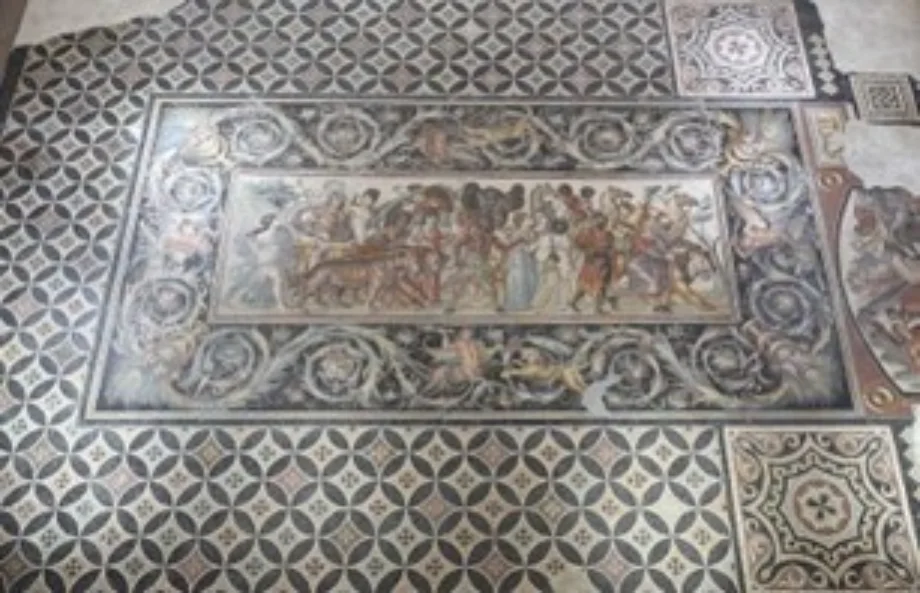
Algiers
Algiers, a beautiful coastal city with a population of around 3 million, is the country’s main center for endoscopy. It is home to three university hospitals and numerous private facilities. Mustapha Bacha University Hospital is the primary site for gastroenterology, endoscopy, and hepatology training and accreditation. The hospital has a divided structure: hepatology operates its own unit with endoscopy (including ERCP), inpatient and outpatient beds, and a high dependency unit (HDU). Gastroenterology has a similar setup, covering general luminal gastroenterology, hepatobiliary services, and inflammatory bowel disease (IBD). Both units have three fully equipped endoscopy rooms with C-arms, and the gastroenterology department provides after-hours emergency endoscopy services.
I met with several department leaders. Prof. Nabil Debzi, Head of Hepatology and former President of the Algerian Gastroenterology Society, emphasized the need for public training and was eager to support training opportunities despite limited funding. He expressed interest in hands-on training and courses at the hospital and was open to an MOUwith WEO. We discussed organizing the first full WEO endoscopy training course prior to the national conference in November, including participants from Sub-Saharan francophone African countries, with logistics to be finalized.
We also met Prof. Afredj Nawal, the incoming Head of the Algerian Gastroenterology Society, who expressed strong support for WEO–AGS collaboration. Additionally, we briefly met Prof. Belhocine, Head of Gastroenterology, who was enthusiastic about a WEO program and suggested creating a research database.
Prof. Belhocine is purchasing an EUS scope and plans a training course for her partially trained staff. WEO can support a joint public–private EUS training meeting in Setif this May, the first of its kind in Algeria.


Raya Clinic Algiers
The private healthcare sector in Algeria plays a significant role, and my visit to the Raya Clinic in Algiers was informative. The 100-bed hospital, owned by a group of specialists, includes gastroenterology, surgery, radiology, and obstetrics and gynecology services. The gastro floor, equipped with four rooms, a general anesthesia machine in each, and the latest Fuji and Olympus scopes, offers EUS, ERCP, and C-arm facilities. The unit head is enthusiastic about teaching, presenting potential for future collaborations

Summary
Endoscopy in the Maghreb is progressing, though challenges remain in building capacity and advancing endoscopy techniques. These can be addressed through WEO’s outreach training program, and by selecting promising individuals for advanced training abroad who can later train others.
I encountered an enthusiastic, talented group of potential trainers keen to help advance training in Africa. Their proficiency in French, English, and Arabic makes them ideal for training across the continent. Most high-quality endoscopy occurs in the private sector, and the academic motivation could lead these professionals to contribute to endoscopy training across Africa.
Action points
· Training courses in Algeria and Morocco are under discussion; focus on people and key contacts rather than specific centers, as they frequently travel to courses within their countries.
· Include key contacts as members of the African Outreach Committee.
· Connect regional training centers with key contacts.
· Arrange an MOU between WEO and the potential training centers in Casablanca and Algiers.